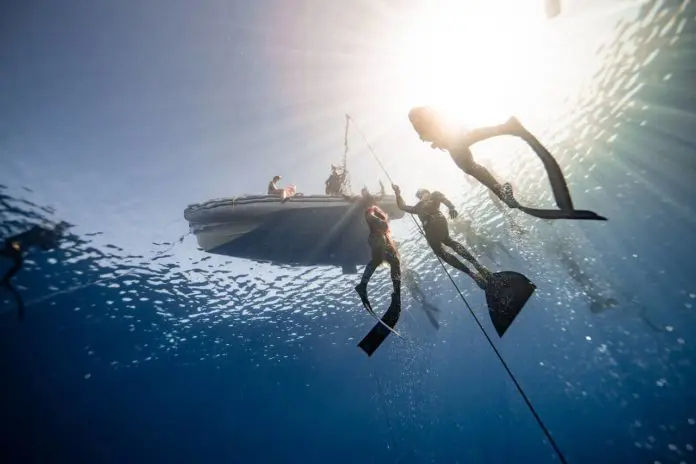I usually try to take pleasure in experiencing new things, but sitting inside a pressure chamber for five hours of breathing pure oxygen gives you a lot of time to think too. How did I end up here? I’ve always prided my self in being a “wise” diver. You know, one of those old-timers who teach others phrases like “There’s always the next time unless you mess up so bad there isn’t”. Increase one meter at a time, do a lot of repetitions, listen to your body. Competitions are won with white cards – all the classics. Sitting there, feeling the thick, over pressurized oxygen flowing in my lungs from the fairly uncomfortable breathing mask with a loud hiss for several hours. Marveling at the construction I’m inside, which must’ve cost millions of taxpayers money to build, with a staff of 3 professionals using a better part of their Saturday to accommodate my quirky hobby, it starts to sink in that this is actually quite selfish what I’m doing. Not to mention putting my family through all this stress, kids asking wide-eyed what a pressure chamber and “the diver’s sickness” are. And thoughts start to formulate around putting some of my introspection into writing.
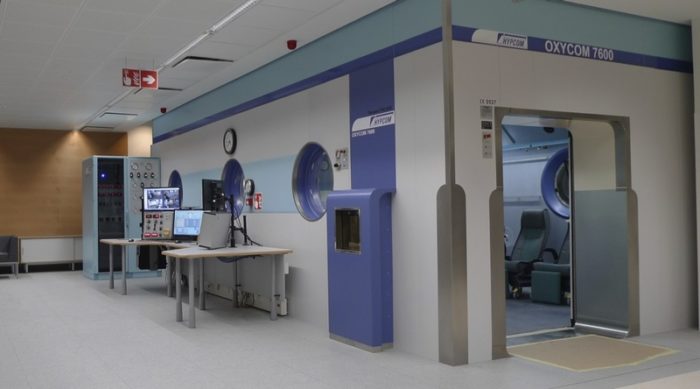
So what am I doing here?
To understand this we must look back at least 10 years. That’s asking a lot from any reader, but I think it’s an important backstory to understand the events leading up to this. I will try to be as honest about it as I can. I wasn’t honest with me, much less others, when it all went down. Shocked, shamed, annoyed and confused – all these things, but not honest. But I want to share my story so others may learn. I’ll be blunt and say I did a lot of things wrong. Not really what you’d expect from an instructor and someone who’s been diving over 15 years and mentoring countless others. I welcome constructive criticism, speculation, advice – all I ask of you is to keep it civil.
So first, let’s jump back to 2007. I was the biggest freediving fanboy and nerd I knew. I had been diving about 5 years and read every post on deeper blue twice. I didn’t have very impressive depths by then, but I did dive a lot. In Nice that year I managed a pb of 57 m without packing. Kind of out of the blue I was asked to participate the AIDA World Championships because someone who was selected to the team couldn’t make it. Wasn’t really something I had planned for, but why not, I thought? I put to work all of my freediving geekiness and devised a concise training plan. Lot’s of mouthfill training, regular open water diving, empty lung dives, dynamics, regular stretching…
So I couple of months later I was in Egypt, locked for 2 weeks in an all-inclusive hotel with just freedivers. Literally right outside the hotel, a few minutes swim away, was all the depths you’d like, and 2 weeks to do nothing but diving. I had already kind of decided that this time I will take the “handbrake” off. That is to say, I had been consciously limiting my progress, as I figured (and was told by wiser divers), this is the way to do it. I knew I had a lot more in me than 57 m but I also had all the time in the world. So the first couple of days we were just kind of messing around, lot’s of repetitions to 30-40 meters, FRC dives, checking the weights…And then we started the serious training. So I went to 60, a new PB, and it didn’t really feel like anything. Then 67, 70, 75 – still nothing. A little lactic acid, a bit of narcosis, but still mouth full of air at the bottom plate, no signs of hypoxia.
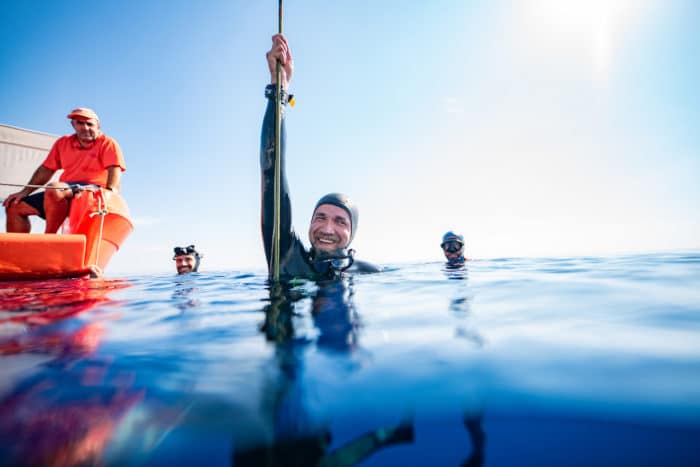
I knew I was progressing too fast, but I had the “7 questions” that I had learned from Martin Štepánek a year before. The basic idea is that when deciding new depths you have to honestly ask yourself (and others) these questions that asses your state. Freediving, or any activity really, is always limited by several vectors, and if you’re honest to yourself, there is always one “weak link” that is objectively holding you back. For example, even if you can dive 300 meters in dynamic, if you can only equalize to 5 meters, then 5 is your depth – easy enough. I’ve forgotten the exact form he told us, but roughly in freediving, the main ones would be: apnea (tolerance to hypoxia), equalization, DCS, muscle fatigue, squeeze, equipment and psychological (from a wider perspective also the capacity of the safety organization). So each time you come up, you asses was any of these a limiting factor. Concretely you ask yourself the same questions every time, for example: did I still have air to equalize at the bottom? Were there signs of cyanosis or LMS? Did I have symptoms of DCS? Did I have symptoms of lung squeeze? And so on. The idea being, if you can answer “no” to each, then you can add some depth. If you answer yes to even one, then it’s time to stay at that depth or even subtract a little. It takes away the hard mental wrestle of deciding depths and turns it into objective criteria.
Down until 85 meters I kept answering “no” in training, but on that one, I had to admit, equalization was a bit tight and I had a mild samba. Back then the national record was 86 meters, so I could just announce 2 meters more and grab that. But I had just witnessed a guy have a massive squeeze and heard him say how he’s gonna announce the same depth for the competition. I could not understand that. I spent a few hours deliberating my decision, but in the end “the questions” clearly pointed to no, I cannot add any depth. So I announced 83 meters, got a white card, but felt that there was not one more meter in me that day, so I was happy. It’s still one of my proudest moments – not just the dive, but especially the announcement. I was really practicing what I preached.
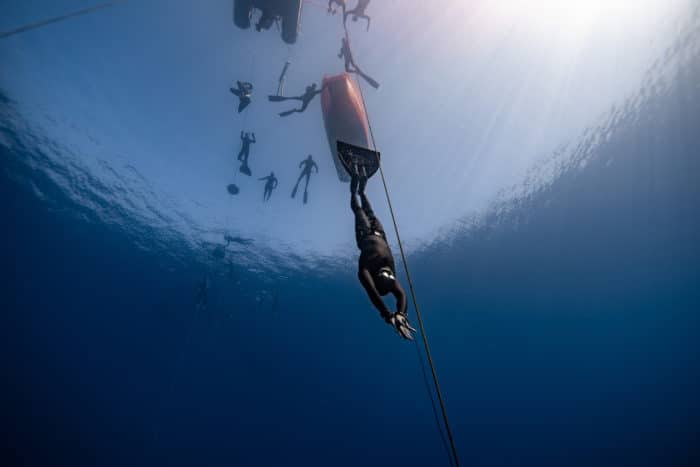
I had higher aspirations, but life just kind of caught up with me. New jobs, new places to live, got kids etc. Anything dive related was mostly politics or bureaucracy in the local clubs, dive federation, and even AIDA. I found my self “diving out of water” most of the time, and honestly, just slowly lost the passion for it. I could do a 50 meter CWT pretty easily and did that once or twice per season, but going deeper than that with the training and conditions I could get to, it was just not happening. But around 2016 the kids had grown old enough that sneaking away for a dive now and then wasn’t a big deal and since I had by then ditched all the politics, I could just go to our events as a “tourist”, just enjoy diving and slowly started to discover that I really loved it again.
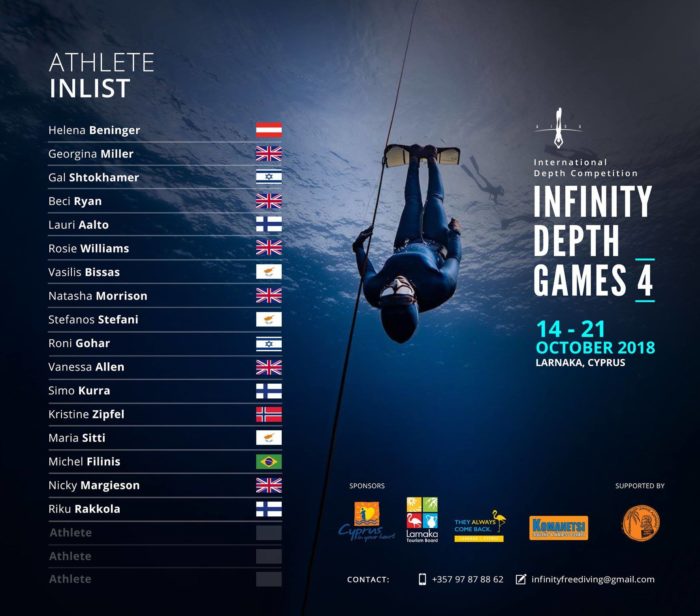
In July 2018, I was diving in an event we do every summer in Asikkala. I was just having so much fun, hitting those 50s, meeting with old and new friends and feeling like maybe there’s still something left in this rotting carcass. And the topic of a competition in Cyprus came up. A bunch of guys were going to attend. I had a week of vacations still saved and from the family front I got the green light, so I signed up and set to composing a feeble training plan.
Okay, so what could I achieve in a couple of months of training? If I could pull an easy 50 in Finland, in the cold, dark water with a 5 mm suit, surely 60 m in Cyprus would be a walk in the park. And I still had time to train. It should be easy to improve my apnea as I had virtually not trained at all. I do these simulated dry CW dives and at the time I could hit the time of 1:40 – the rough equivalent of 60 meters. If I could push that to something like 2:20, I should be good for 70-80 meters (my PB dive of 85 was 2:40). And I still had almost a week of adaptation on site. So I set to it. Dry statics, wet statics, simulated CWT dives dry, some gym work, empty lung dives in the pool…And I did gradually increase. Statics went from sub 5 to 6, simulations in the 2:20s and I wasn’t even packing yet. And I had kind of decided not to, too. I’ve been really uneasy about packing for a long time and recent studies have not made it any better. So I figured, I want to see how long I can go without packing. Then if I someday hit the limits of that, maybe I’ll take a gulp or two of air “just to make sure I’m full” – but no more than that.
Fast forward to today
So fast forward to October and Cyprus. The plan was, on the first day, I will check my equipment, do easy dives to maximum 40 meters, give my self some time to adapt and get the game going. After the initial trouble with gear, diving was going so nice, I decided to do a 51 m dive after all. You know, symbolic 1 meter more than seasons best, just to mark my territory. If I could do 50 back home, 51 should be a walk in the park. And it kind of was. Sure I lost the mouthfill, started before OT, the duck dive was funny, I had problems finding a good kick in the beginning, but I still had a week to get it right – it was a good start. I was a little bummed that our boat wasn’t going to the wreck Zenobia, which I really wanted to see, but figured we’d get to see it so many times during the week I’d be tired of it by the end of it. So back to the hotel, a good meal, a feel-good beer, and repeat the next day.
So next morning at the lines I decided to go for an FRC dive while practicing my mouthfill. I Didn’t want to lose that again, so better hone that routine. I made it all the way to the plate at 30 and did a small hang. Feeling a proper crush, but still comfortable, mouth full of air, no signs of hypoxia upon surfacing. I did another one, less air, more crush, longer hang…Still fine. So a plan starts to form in my head…What if, instead of doing another 50, I’d go for something deeper. Just like in the old days, “no hand break”, just keep going as long as it starts to feel uncomfortable. What would be a good depth? 55? 57? I get to the line and on a whim announce 60. Preparation went much better. I was focused, hit the OT this time, much better duck dive, strong and relaxed kicking until about 25 m, mouthfill…Well ok, couldn’t really get a good fill, but this should last to 60 meters easily. I hear the alarm at 50, but now I cannot squeeze any air from my mouth so I revert to reverse packing, manage to get just enough out to equalize once. Hit the plate, ears a little uncomfortable, but nothing too serious, but no reason to stick around here, so I dart to the surface with the best technique I can, arms stretched nice strong kicks. Surface strong, protocol, smile, shake a few hands, the suppressed “woohoo”…Wow, back in the game eh? And only the second day, what great dives await.
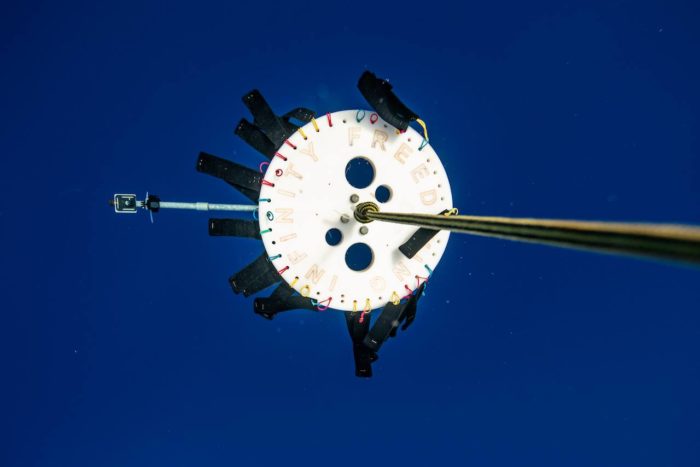
So I rest a good 15 minutes and think I’ll just practice my mouthfill and duck dive to get ready for the next day. I really don’t want to mess up that mouthfill again. See there are two things I’ve never been held back by. Equalization and squeeze. Equalization I did a lot of work on. Squeeze, I guess I’m just genetically fortunate, but I just never had that problem. So I went for a relaxing dive just to practice the mouthfill. Right from the start, it felt bloody awful, like just the feeling of being underwater, just felt completely unnatural. Strange kind of acidic, burning sensation on my chest. I got the mouthfill right this time though, drop to 40, come up and decide ok, no more training today. Whatever that was, I better save my strength. I do a couple of safety dives for others and get on the boat. I notice a weird metallic, salty taste in my mouth…Must be the seawater, so I rinse it out by drinking some water and take a deep breath…Oh, that’s weird, breathing feels kind of heavy. Could it be that I’ve…Nah, not me, Mr genetic lottery. Ok, if I huff and puff, wheeze and cough, yes I can actually produce a tiny speck of red in the spit. Better rest and be wiser tomorrow.
“Who wants to go to Zenobia?”, someone announces. Well, I sure do, we missed it yesterday. So we go and how it is just perfect visibility that day. Maybe I can just see it from the surface you know? Oh but it looks so magnificent! And there go my friends and those Japanese mermaids. And look, scuba-divers, how we all love to show off to scuba divers…And really those dozen or so dives to 15-25 m, even despite the growing discomfort, were truly magnificent. We come to the marina in good spirits, agree to take a rest and then head for lunch.
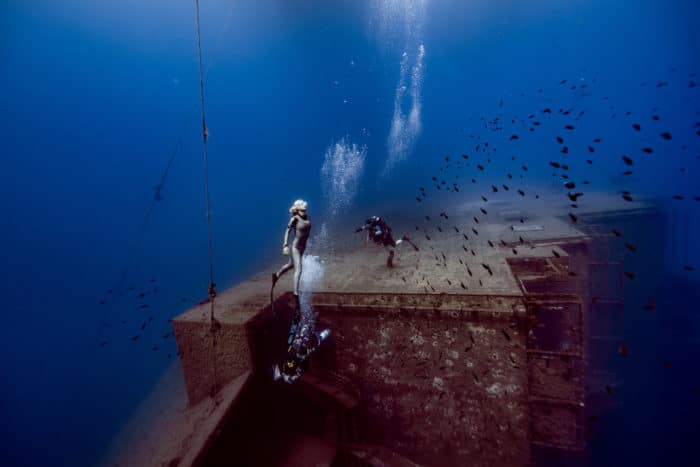
I rinse my stuff, put it out to try, take a shower. So what about this discomfort, oh yeah, it’s still there. If I really huff and puff, I can get a sort of a gurgling sound – a strong blood shift I guess. But wait, I get a sudden urge to cough. A big brown piece of phlegm flies out (obviously old blood). Well, that ain’t good. I decide to drink a lot of water, and just sort of lay on the bed. After the mandatory updates to social media, I realize I cannot really hold my phone for long before my hands get kind of numb. By this time I realize I must’ve had a squeeze, a proper one. How stupid of me, but no big deal, these things happen and we can still remedy this. I’ll just take a day off, then see if I can get back into the slowly increasing the depths to whatever feels comfortable. So lot’s of water, long walks to ventilate it “out of the system”, eat healthily…We agree to take a day off tomorrow (we had planned the day after originally), get a chance to see the city a bit, maybe have a few drinks – yeah sounds like a plan.
The Nordic Trap
At this point, I should point out that this is actually a “classic” pattern, the “Nordic trap”. We spend so much of our season in the pool, or in crappy open water conditions, we build up this expectation of “when I get to the warm on blue, I’ll be ripping”. And then you have only a week of diving, you’ve paid an arm and a leg for your trip, you have a schedule – how do you go from 50 to 70 in a week? You gotta get down to it right away, right? The answer is of course – you don’t! You simply start building where you are comfortable, to where you stay comfortable, or very slightly uncomfortable. I know this, I frigging preach this! I’ve shunned guys who fall into this. I really not only should but do know better.
So the next morning I wake up with a hangover. Healthy eating and water…Or maybe good delicious meal A few drinks, right…like that ever worked. Maybe drinking with a lung squeeze wasn’t the best idea, but it should’ve been out of the system by then. So I get up, only to realize that I almost pass out. This again is nothing new, being a tall guy, I get these orthostatic attacks often when dehydrated or laying for a long time. I never actually pass out, just have to wait a few seconds and it passes. Only this time it takes longer than usual. And overall I kind of feel like shit. A headache, nausea, fatigue…We’ll normal hangover symptoms, right? Better take it real easy today. Eat well, take a walk, enjoy the sun, tomorrow is another day.
By this time I remember something I used to do back in the day. Stretching! Oh yes, there was this thing…I do the routine the best I can and realize my range of movement is really just awful. When I do the stretch extending my arms above my head like in a monofin stroke I really even can’t extend them without being extremely tight all over the upper body. This must’ve contributed to the squeeze and reminds me of another thing I had forgotten. Back in the day, I had this “sack of potatoes” paradigm, another teaching from Martin Štepánek. Being streamlined for most of the way is all well and good, but once you get close to your target depth, it really doesn’t matter that much, you get a good velocity in almost any position. However, what matters is being relaxed and not making any unnecessary straining or strange movements in the upper body. So the last meters you fall like a sack of potatoes, and the first few meters back up, you also swim very relaxed, arms to the side. I wish I had remembered that on my 60 meter dive and not darted up like a bat out of hell.
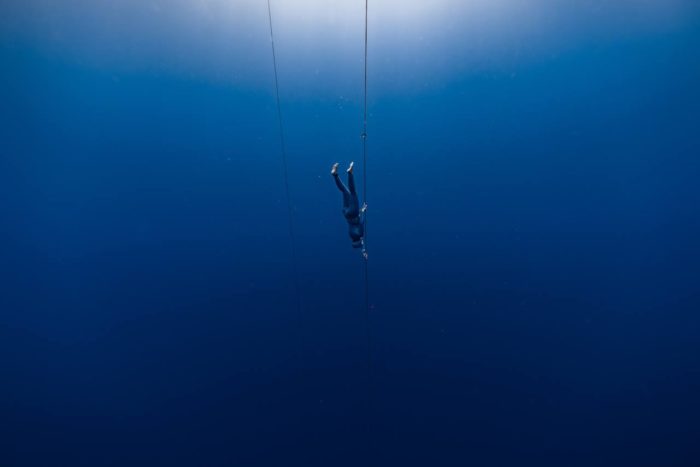
The next dives I take it real easy. I make sure I stretch properly before each day, and even in a couple of days that makes a real difference. I visualize myself as a sack of potatoes – easy enough with the current physique I have. I speak with Lauri, another Finnish diver who’s had experience with squeezes how long the symptoms usually take. “Never felt anything the next day”, he says, even on serious ones. I still don’t feel completely recovered, so I’m a bit concerned. So no extreme empty lung hangs, just a few traditional warm up dives, then something in the 40s. I have no signs of hypoxia, but I feel “out of breath” when surfacing. No wheezing breath and no brown saliva though, so the next day I do 50+, feeling much better, still no symptoms. Time to announce performances for the first competition day. My head is spinning with numbers, everything from 50 to 67 (don’t know exactly why 67, why not 66 or 68, but the mind is weird that way). I quickly realize there is no way I can responsibly announce a depth deeper than the 60 where I squeezed, so I say 59.
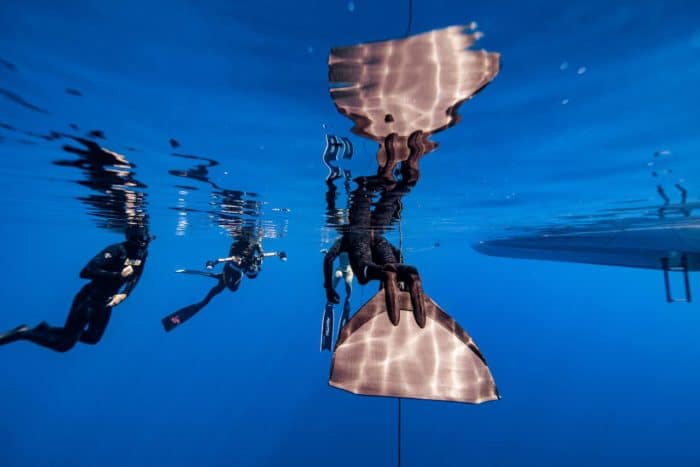
Next morning, on the boat to the dive site I adjust my alarms and get ready. Warm ups go nice, preparation, start, descent…All perfect, I’m for the first time really enjoying a dive. This is how it should feel! I hear the alarm at 55 and happy I made it, so I relax the mouth fill…Start to look for the candy cane. Seconds pass…Ears are starting to feel uncomfortable, I look down and the plate is still at least 5 meters away. Then I hear another alarm..What the hell? It dawns on me that I did correctly add the alarm for 55, just I forgot to remove 45, so that is what I was hearing first. A few meters later I just feel that I can’t make it. It’s literally at an arms length, but ears are already hurting, so I swim to the surface. It was an easy dive hypoxia wise, but a yellow card. Of course, I was a little bummed, I believe that is my first non-white card in depth disciplines, but I don’t beat my self too bad. Failures are like these badges you must collect to become good. The important part is to learn from them. I wait 15 minutes, check my breathing, no sights of a squeeze. So I’m happy. We go again to Zenobia afterwards. There is a bit of a current, visibility is kind of poor and were tired from 3 days of consecutive diving, so it’s not as good as the first time. We do a few dives, then get picked up and that’s the competition for us. A little celebration, a few too many drinks again, goodbyes…Such a good time, such nice people I’ve met, I’ll definitely want to come back next year.
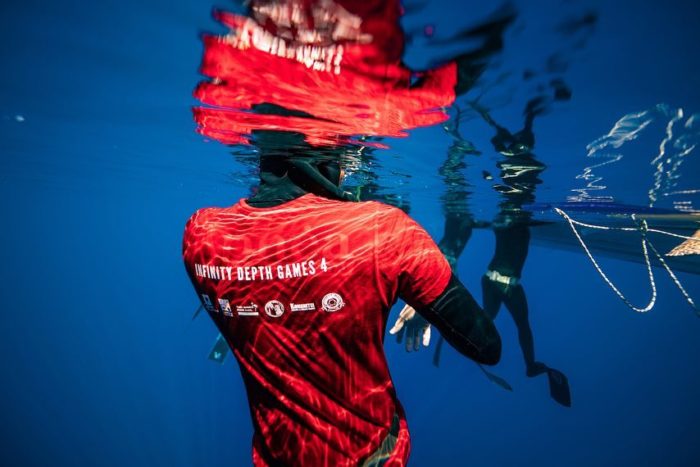
I take an early morning flight home and it feels good to be on the way back too. That weird numbness still persist on my left hand. I Get home, hug the wife and kids, give them their presents life is back on track. Next day working from home, get the hang of it surprisingly quick, the first bug fixed before noon. I’m uncomfortable sitting at the desk though, hands get numb and my wrist hurts, but this is normal since this is not my normal work desk. I notice that when I walk stairs or pick something up from the floor I feel like “sighing heavy”, kind of a strange out of breath feeling. I also feel pain on my left shoulder, elbow and fingers. Weird, kind of like DCS symptoms, but there is no way I could get that from those dives I did. Must be something left from the squeeze and just fatigue.
I have this annoying habit that despite being fairly composed in the daytime, sometimes I wake up in the middle of the night and get some negative idea in my head, which the sleepiness just blows out of proportion. So all of the sudden I get this in my head at 3 am: “You didn’t exhale!”. You always exhale 5 meters before surfacing, to make sure you don’t get lung over expansion injuries. Glad I didn’t pack though…Oh wait, but I did, didn’t I? Where did that sneak in again? I did like 10 packs! So the theory out there is – you pack your self full of air, barely able to hold it, then you dive deep. Your lungs compress and you get a “pulmonary erection” (love that expression, thanks to Guillaume Nery) – ie. the lung swell up to fill the space. But now when you come up, your lungs have less volume in them than when you left, but you still have the same amount of air, rapidly expanding. So if you don’t exhale a bit, you get higher pressure in there than when you packed, possibly leading to over expansion injuries. And I didn’t exhale! So now, in the middle of the night, I’m laying in bed convinced I’ve ruptured a lung or got air embolism or something like that. All of the sudden that “heavy sigh”-feeling blows up to images of lung tissue slowly withering a way in gangrene, those weird pains and numbness gas bubbles blocking blood flow, slowly eating away at the tissue. It’s a nasty feeling. I’ve hurt muscles, tendons, limbs fingers and toes in other activities. It’s painful, but you always kind of know it’s going to heal. But the lungs, that’s your “life organ”, you don’t want to mess with that. And you can’t really see in there or fix it yourself, so the uncertainty of it maybe slowly dying is not exactly comforting. I eventually manage to calm my self down and fall back to sleep – if I was dying I would be dead by now. But the next morning I decide to contact DAN anyway. I write an email to the “non urgent” medical@ address – don’t want to be a bother…At the same time, I check up on if my insurance is OK. I bought it just 2 days before the trip so it should be, but I never received any confirmation, which is weird. So eventually I notice I had made the transaction but set the due date a week after, so the money never left my account – in other words, I was not insured when it happened.
Finally, I get an answer from DAN, they say they don’t think it sounds too alarming. DCS and freediving is really uncommon and my description of the dives does not sound like a cause for too much concern. Somehow I think they don’t really understand my explanation of how freediving could lead to over expansion injury. But the bottom line is, if you have symptoms, it might be good to go though a hyperbaric treatment “just in case”. Which is well and good, but I haven’t got a frigging insurance. But here I must really love the Nordic welfare state. I call up the national hyperbaric treatment center, and they are all like “yeah, just come here, we have free times today”. 2 hours later I’m in there, getting all pressured up. An X-ray of the thorax didn’t show anything alarming, so I guess that rules out the over expansion thread. Over the treatment, the operator keeps asking me periodically “are the symptoms getting better”. Are they? I dunno…Maybe? Did I really have symptoms to being with? Was I just making it up? Or are they better, maybe I’m just feeling placebo. I just sort of go “I dunno, maybe” – the best answer I can honestly give. I’ve never experienced a lung squeeze, a “crazy over expansion injury” or DCS – by this time I’m pretty confused about what I’m supposed to feel like. But they tell me mild DCS is kind of always like that, the symptoms are vague, they come and go, but the common theme is that they are gone by the time the treatment is done. But almost 6 hours in the chamber is a really good time to reflect on things.
Why did I think diving is like riding a bike? Well devilishly, parts of it are, while other parts, the critical and dangerous parts, are not at all. And having just met a world record level competitive cyclist in Cyprus, I now realize even the idea of “just like riding a bike” is actually a very wide spectrum of skill levels. But with any skill, especially diving, you have to build up to it. You have to acclimatize, let both your mind and body get used to the depth. Stretching is good and so are the sack of potatoes, exhaling on surfacing. Stuff I knew but didn’t instinctively remember. And you got to respect the fact that the age 41 is not the new 25, you just don’t recover as fast, stretch as naturally etc. It’s no excuse to take it faster, quite the opposite, go even slower.
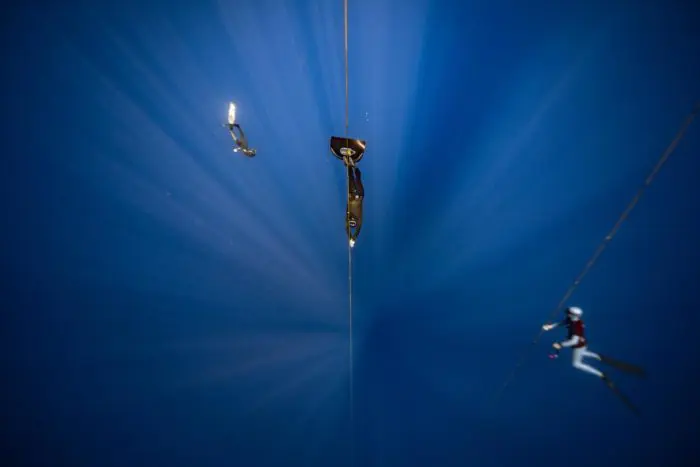
I recently picked up the guitar again after over a decade of inactivity. I could not even remember the opening riffs to songs I used to know backwards and forwards. Some stuff had obviously stayed, the most common cord shapes, scales, things like that, but for one I could not even play more than 15 minutes, because my fingers simply lacked the calluses that harden on your fingertips after you play a lot. A year of daily practice later, my fingertips are like an armor of hardened leather and I have surpassed my playing level of 15 years go…Why should freediving be any different? To maintain a skill, you have to actively practice it. To surpass it, you have to be methodical, analytical, curious, passionate and explore.
So did a get the bends? I don’t know, honestly. It seems unlikely that those depths could’ve build up so much nitrogen. Then again, I’ve heard of people getting it on shallower dives, and on completely unexpected dives. DCS especially in freediving seems not to be fully understood, I certainly don’t know it well enough. Maybe pumping those dives at the Zenobia after a squeeze, repeated mid range dives with a hindered gas exchange, contributed? Maybe it was just left over symptoms from the squeeze, amplified by the mental anxiety from this and the rest my mind just made up. Or maybe it was just something completely different in the combination of packing, lung squeeze, over expansion repeated dives…Some have suggested it was a combination of squeeze (possibly already from the warmups) and packing. You sort of damage the lung with a squeeze, then force air in there with packing, which might end up as air in the wrong side of the lung. Essentially Arterial Gas Embolism, but to a lesser degree than on Scuba, which would result in “strange and unexplained tricky symptoms”. All I can really say for sure this was not normal or something I have experienced before.
What I do know is that despite the free meal, the geekgasm of “being in an actual pressure chamber!” and extremely nice personnel, the hyperbaric treatment was uncomfortable enough of not wanting to end up there again. Breathing pure oxygen from a heavy mask at almost 3 bars pressure, is not nice. I never noticed on scuba, but the air just get’s kind of dense and heavier to breath at those depths. Doing it for hours is hard labor, actually. And oxygen kind of starts to “taste like shit” after a few hours. And the chamber is a noisy place and on the way up it get’s kind of cold. And no, you cannot take your phone in there. And obviously there is no toilet in there, just a bottle for you to pee in, and we all know what happens with increased pressure in regards to that.
When I discuss freediving with non-practitioners, it often comes up that they think one must posses some serious courage to do these deep dives. Up to a point it is true there are psychological barriers to over come, but after you do it a while, it becomes kind of second nature, you’re not thinking about death every dive, you know, it’s actually enjoyable. What really takes balls for us freedivers is to not dive. This is really really hard sometimes. You got all these expectations for yourself, imaginary expectations you project to others, maybe even some sponsors, god knows some may even have fans. But you feel like this is not the day – what do you do, wuss out? That is precisely what we should do, that takes courage!
So will I stop diving? I don’t think so, I just love it too much. But hopefully, I’ll be a bit wiser about it.
Improvement Ideas
With the superpowers of hindsight I can identify the following improvement ideas:
- Training should incorporate regular stretching
- There is no substitute for actual depth training. Even in October in Finland, it’s recommended leading up to an event. Pool stuff, e-dives, stretches etc all help, but they don’t make you a deep diver.
- Don’t set your goals based on what you did 10 years ago
- If you get squeeze symptoms, let people know. Don’t try to hide it. Maybe those nice people even have some oxygen – which greatly helps the symptoms and speeds recovery. And make sure there is oxygen available.
- If you squeeze, stop diving right then and there
- If you don’t have the routine, don’t do extreme dives. Work on the routine first (countdown, duckdive, descent, mouthfill, a sack of potatoes, ascent, exhaling, hook, protocol)
- Ageing doesn’t go on in reverse just because you get a break from home.
- You’re not going to break world records anyway, so just take it easy and enjoy the ride. Personal development is good, commendable even, but not chasing crazy ghost divers at depth.
- Don’t change anything before a competition dive. Anything, just no, not even the innocent little alarms…You try things out in training, make adjustments in training, but not on competition dives. If you always drink coffee, do so also on comp day. If you never do yogic handstands, don’t start on competition day, however impressive it may look when the other guy does it.
- If you have DCS symptoms, just get to the chamber, don’t think “I don’t want to be a bother”.
- Make sure your insurance is up to day preferably more than 2 days before the trip, like 3, at least.
And if I do start to get more problems with DCS – that’s the 7th question for me, that’s the end of “competitive style” diving. But we all got to stop sooner or later. You cannot change that fact, but you can prolong when that happens by being wise about it.
Stay safe, have fun and enjoy the 1.35 billion cubic kilometers of water the universe has kindly provided us with!

